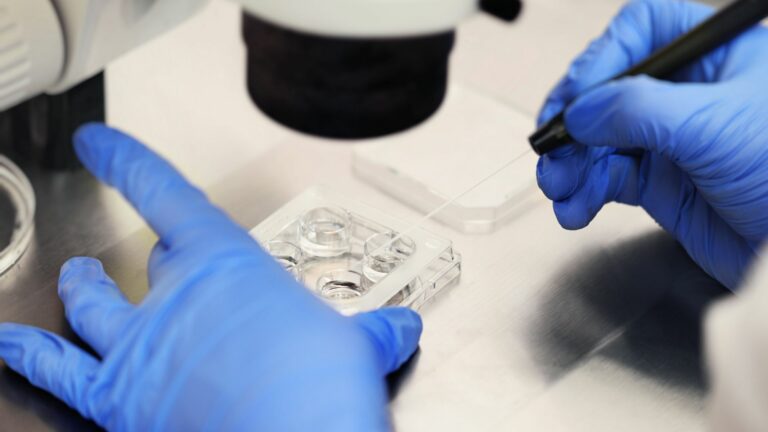
For women undergoing In Vitro Fertilization (IVF), exercise can be a source of confusion and concern.
Many wonder if physical activity is safe during treatment or if it might negatively impact their chances of success.
Fortunately, the notion that exercise can “ruin IVF” is largely a myth. In fact, regular, moderate exercise can provide numerous benefits for both physical and mental well-being during the IVF journey.
Key Takeaways
| Key Point | Explanation |
|---|---|
| 1. Exercise is generally safe during IVF | With doctor approval, moderate exercise can be continued throughout treatment |
| 2. Benefits include improved circulation, stress relief, weight management, and better sleep | Regular activity supports reproductive health and overall well-being |
| 3. Exercise plans should be individualized and adjusted based on treatment stage | Recommendations adapt as patients progress through phases of IVF |
| 4. Low-impact activities are preferred, while high-intensity exercises are discouraged | Walking, swimming, and prenatal yoga are safe options; avoid HIIT and contact sports |
| 5. Listen to your body and prioritize rest when needed | Hormonal changes and side effects may require workout modifications |
1. Understanding the Benefits of Exercise During IVF
Engaging in regular physical activity during IVF can yield several important benefits:
- Improved blood flow: Good circulation supports reproductive organ health and aids in the development of quality eggs and embryos.
- Stress reduction: Exercise triggers the release of mood-boosting endorphins, helping to manage the emotional ups and downs of treatment. Incorporating stress-relieving activities like yoga and meditation can further enhance this benefit.
- Weight management: Maintaining a healthy weight can improve IVF success rates. Exercise, combined with a balanced diet, can help achieve optimal body composition.
- Better sleep: Consistent exercise promotes more restful sleep, which is crucial for overall health and well-being during the demanding IVF process.
It’s essential to consult with your IVF specialist before beginning or modifying any exercise routine. They can provide personalized guidance based on your unique medical history and treatment plan.
Discuss with your doctor: What specific exercises do you recommend for me during IVF? How can I best incorporate physical activity into my treatment plan?
2. Preparing Your Body for IVF with Exercise
Establishing a fitness routine before starting IVF can set the stage for a smoother treatment experience and potentially enhance outcomes.
Consider these steps to get started:
- Talk to your doctor: Discuss your exercise goals and any pre-existing health concerns that may impact your workout plan. They can clear you for specific activities and advise on appropriate intensity levels.
- Begin gradually: If you’re new to exercise, start with short, low-intensity sessions (10-15 minutes) a few times per week. Focus on building a consistent habit before increasing duration or frequency.
- Find enjoyable activities: Choosing exercises you genuinely enjoy will make it easier to stay motivated. Explore options like walking in nature, swimming, dance classes, or gentle yoga.
- Listen to your body: Monitor your body’s response to exercise. If you experience pain, excessive fatigue, or shortness of breath, scale back and consult your doctor.
Remember, your exercise plan will likely need adjustments as you move through the various stages of IVF.
Maintain open communication with your care team and prioritize activities that feel safe and comfortable for your body.
Share your experience: What exercises have you found most enjoyable and sustainable during your IVF journey?
3. Navigating Exercise During IVF Treatment Stages
As you progress through the phases of IVF, your exercise recommendations may change. Here’s a general guide to approaching physical activity at each stage:
Gentle Exercise Options (Suitable for All Phases)
- Walking: This low-impact activity is an excellent way to maintain fitness without overexerting yourself. Aim for 20-30 minute walks most days, adjusting pace and duration as needed.
- Swimming: The buoyancy of water makes swimming joint-friendly and relaxing. It’s an ideal low-intensity cardio workout throughout IVF.
- Prenatal yoga: Specialized yoga classes focus on gentle stretching, breathing, and relaxation techniques safe for all stages of treatment. Many studios offer classes tailored to fertility and pregnancy.
Moderate-Intensity Exercises (Doctor Approval Required)
With clearance from your IVF specialist, you may be able to incorporate these moderate-intensity options:
- Light aerobics: Low-impact aerobics classes like dancercise or Zumba can provide a fun cardio workout. Avoid high-impact moves and modify as needed.
- Cycling: Stationary cycling or leisurely outdoor rides can boost circulation and cardiovascular health. Use a comfortable seat and avoid overexertion.
- Modified Pilates: Gentle core-strengthening exercises can be beneficial, but avoid moves that strain the abdominal muscles or require lying flat on your back. Seek out routines designed for prenatal or post-partum periods.
Exercises to Avoid
- High-impact activities: Steer clear of exercises involving jumping, running, or jarring movements, as these may increase the risk of ovarian torsion.
- Contact sports: Activities with a high risk of falls or collisions, such as kickboxing or basketball, should be avoided to prevent injuries.
- Hot yoga: Heated environments in hot yoga classes can potentially raise core body temperature, which may not be ideal during IVF.
Get expert insight: Ask your IVF specialist about exercise guidelines specific to each phase of your treatment plan.
4. Listening to Your Body’s Signals
During IVF, it’s crucial to pay close attention to your body’s responses and adapt your exercise routine accordingly.
Hormonal fluctuations, medication side effects, and the emotional strain of treatment can all impact energy levels and how your body tolerates physical activity.
Recognizing Signs You Need a Break
- Unusual fatigue: If workouts that normally feel manageable lead to excessive tiredness, it’s a sign to scale back. Take a rest day or opt for a shorter, lower-intensity session.
- Prolonged soreness: Muscle soreness that lingers for several days post-workout indicates your body needs more recovery time. Focus on rest and gentle stretching until the soreness subsides.
- Shortness of breath: Becoming winded more easily than usual during exercise is a cue to reduce intensity or take a break.
- Bloating and discomfort: IVF medications can sometimes cause temporary bloating and abdominal discomfort. Adjust your workouts as needed, favoring low-impact options like walking or prenatal yoga until symptoms improve.
Adjusting Workouts Based on Body Feedback
| If you feel… | Try this workout modification |
|---|---|
| Unusually fatigued | Reduce session duration (e.g., 30 minutes → 15-20 minutes) |
| Prolonged soreness | Take an extra rest day and focus on gentle stretching |
| Short of breath | Lower intensity (e.g., moderate cycling → leisurely walking) |
| Bloated and uncomfortable | Opt for low-impact activities and avoid abdominal strain |
Remember, even on days when intense exercise feels out of reach, light movement like a short walk or stretching session can still provide physical and mental benefits. The key is to honor your body’s signals and make adjustments as needed.
Share with a friend: Do you have any tips for modifying workouts based on how your body feels during IVF? Reply and let me know!
5. Staying Motivated and Finding Joy in Movement
Sticking with an exercise routine can be challenging during the ups and downs of IVF. These strategies can help you stay motivated and find enjoyment in physical activity:
Focus on the Benefits
- Stress relief: Exercise is a natural mood-booster. Even gentle movement can release endorphins and help manage the emotional rollercoaster of treatment.
- Improved sleep: Regular physical activity promotes more restful sleep, vital for overall well-being during IVF.
- Energy boost: While fatigue is common during treatment, low-intensity exercise can actually increase energy levels and help you feel more capable.
Find Your Exercise Happy Place
- Explore different activities: Experiment with various workouts until you find ones that genuinely bring you joy, whether that’s dancing, hiking, or prenatal yoga.
- Buddy up: Exercising with a friend or partner can provide accountability and social support. IVF support groups are also great places to connect with others who understand your journey.
- Set achievable goals: Start with small, realistic targets and celebrate each milestone along the way. Gradually increase duration or intensity as you build strength and endurance.
Practice Self-Compassion
- Honor your limits: It’s okay to modify workouts or take rest days when you need them. Be kind to yourself, especially on days when you’re feeling emotionally or physically depleted.
- Celebrate non-scale victories: Focus on how exercise makes you feel (stronger, more energized, less anxious) rather than fixating on weight loss or performance metrics.
Remember, every bit of movement counts, no matter how small. On difficult days, even a short walk or gentle stretching session can help you feel more grounded and resilient.
Looking for support and guidance on your IVF journey? Connect with experienced specialists and compassionate care teams at our partner clinics across India.
Find the help you need in Gurgaon, Dehradun, Kolapur, Warangal, Asansol, Nanded-Waghala, Ajmer, Jamnagar, Siliguri, and Jammu.
Get social: Share a photo of your favorite gentle exercise activity on social media and tag 3 friends to encourage them to prioritize joyful movement during challenging times.
6. Key Takeaways for a Healthy, Active IVF Journey
Regular exercise can be a valuable support tool during IVF, promoting physical and emotional resilience.
As you navigate your treatment journey, keep these core principles in mind:
- Consult your IVF specialist regularly to ensure your exercise plan aligns with your unique needs and treatment protocol. Keep them informed about any changes in energy, pain levels, or overall wellbeing.
- Focus on gentle, low-impact activities like walking, swimming, and prenatal yoga to maintain fitness without overexerting yourself. Gradually increase intensity only with doctor approval.
- Listen to your body’s signals and modify workouts as needed. Unusual fatigue, persistent soreness, shortness of breath, and bloating are all cues to scale back or rest.
- Find activities you truly enjoy to stay motivated. Explore different options, enlist workout buddies, and set small, achievable goals to build momentum.
- Approach exercise with self-compassion, honoring your body’s changing needs. Celebrate your commitment to movement, no matter how small, and remember that rest is productive too.
By incorporating mindful movement into your IVF journey, you can harness the power of exercise to support your overall well-being and resilience during this challenging yet hopeful time.
Your consistent efforts, coupled with grace and flexibility, can help you navigate treatment with greater strength and ease.
Reflect and share: What role has exercise played in your IVF experience? How do you plan to prioritize joyful, mindful movement going forward?






